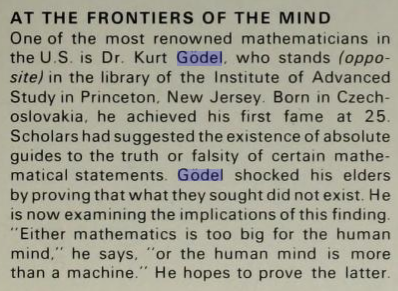Black hole evaporation
Recently, István Németi pointed out to me that there is an omission
in my book regarding the feasability of his relativistic hypercomputer.
In particular, the following passage
the word Morover should be replaced with However and the text should be augmented with a conclusion of the form
in my book regarding the feasability of his relativistic hypercomputer.
In particular, the following passage
In 1974, Stephen William Hawking [80] proposed that black holes
emit thermal radiation, now known as Hawking radiation, due
to quantum effects. Thus, any black hole will vanish sometime
in the future. If Hawking radiation is indeed a real phenomenon,
then it is possible that a relativistic computer G will not be
able to finish a particular supertask it was assigned to finish.
The reason is that the black hole that the computer orbits
around might evaporate years before the computer completes its
task. Moreover, Hawking radiation should play a role in cases
in which the black hole has very small mass. For instance, a
black hole of one solar mass will evaporate in 1067
years, while a black hole of 1016 kg will evaporate
in 3 billion years.
the word Morover should be replaced with However and the text should be augmented with a conclusion of the form
Since we are using extremelly large black holes, Hawking radiationApostolos Syropoulos
should not concern us, even if it is a real phenomon. In Section 5.4.1
of [140] there is a detailed discussion of Hawking radiation and
relativistic hypermachines.

Σχόλια